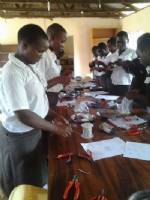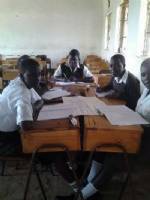After
2 years in the planning and 24 hours of travel door to door, we finally made it
to Usueni School to be greeted by the most amazing welcome from the girls and
the staff. The singing was enough to
revive us after the long flight via Amsterdam and the 6 hour road journey and
was a real and much needed pick-me-up !
We
were delivered to our accommodation and just had time to unpack and freshen up
before the first of many great dinners with the staff who quickly became
friends. The hospitality of the Kenyan
people is second to none.
The
following day we awoke to the sounds of the chickens and cockerels in the school
compound which became an integral part of our morning routine. The girls had already been up for a few hours
prior to this and were already in their classrooms and had started their school
day, such is the importance of their education to them.
We
quickly followed suit and were ready to begin our first workshop sessions. The group of 45 girls had volunteered for this
new programme and were ready to undertake workshops in jewellery making,
textiles and entrepreneurship.
The
thinking behind the programme is to enable the girls to set up small businesses
in order to be financially independent and able to make their own choices when
they leave Usueni.
The
classroom I was teaching in was a blast from the past, chalk, a blackboard and
rows of desks awaited and it wasn’t without trepidation that I entered and
began to set up for my first entrepreneurship workshop. The girls arrived and took their places and
it wasn’t without nerves that I started to teach in an environment that I had
last encountered back in the 1980s when I began my teaching career.
The
girls were very quiet and an expectant hush fell as I began the first of the
sessions I was to run. We looked at
their ambitions for the future, where they saw themselves in their adult life
and their hopes and aspirations.
Normally this session is one that evokes a lot of discussion but the
girls were quiet...... almost too quiet !
It became clear that the teaching methodologies we would employ were
quite different to what the girls were used to experiencing but they were
starting to open up so it was worthwhile persisting and this discussion eventually
opened up a lively conversation and the shyness of the girls began to wear off
very quickly and this set the scene for the future sessions.
So,
I need not have worried as teenaged girls have proven to be the same the world
over !
The
students then were allocated to groups of 5 based on their shared skill sets so
they could complement each other when it came to setting up and running their jewellery/textiles
businesses.
Once
set up in teams of 5 the subsequent sessions then began to look at the
practicalities of running a business.
Day
2 saw us proceeding with sessions to work out the finances of running their
businesses. We needed to know how to
cost to produce each item of jewellery or textiles and also then to price these
items fairly ready to be sold to the tourists in the game lodges or to their
friends and family.
Much
mental maths was undertaken (very effectively by the girls) and a “cost plus”
pricing system was established. In line
with young entrepreneurs I work with in the UK, it is always their own
skills/expertise and time that students do not account for and this makes
pricing of items unrealistic. This was
overcome with some examples of products the girls had made in their jewellery
workshops and the comparison proved to be an effective way to teach this
concept.
Final
sessions in entrepreneurship involved looking at effective ways to market the
products that the girls had made. We
looked at labelling and how we can use the girls and their own stories to
market their items to the tourist trade in particular.
We
developed logos for each company, company names, USPs and straplines all of
which can be replicated easily using a PC and a printer.
In
the textiles workshop, Sally overcame the challenges of the treddle sewing
machines to cover techniques such as appliqué, reverse appliqué, plastic
binding and “big bobbin” to show the students various methods of surface
decoration that can be added to many types of textile product. The students completed sample books of each
technique and have these to refer to when they return after Christmas and begin
to make their own textile items such as bags etc. Sally also spent a lot of time wit the sewing
teacher and she received a lot of input on the use of the machines and the
techniques which she wil be bale to build upon after the girls return for the
new academic year.
In
the jewellery making sessions, Rob led the girls in a range of new techniques
and also specialised in using “found” items in order to make jewellery. This had the impact of lowering the cost of
manufacturing and in turn increasing the potential profits that were
possible. Aluminium cans and plastic
bags were just some of the items that were upcycled into both jewellery and
textiles. The new hand tools we brought over and left at Usueni will speed up
the jewellery making processes and also increase the range of items it is
possible to make.
We
have left behind 45 girls organised into 9 student companies at Usueni with enhanced
practical skills in jewellery making and textiles that can become small
businesses and could possibly pay for individual’s school fees hopefully
reducing the umbers of girls who are forced out of school.
We
have also brought home a quantity of the girls’ jewellery which can be sold in
the UK and the income repatriated to Usueni to cover the costs of the girls’
materials and to buy more stock to make the businesses sustainable in the long
term.
Many
times during our visit we heard the girls being told they were privileged to
have us come and teach them – the privilege was entirely ours.
Asante
Usueni !





